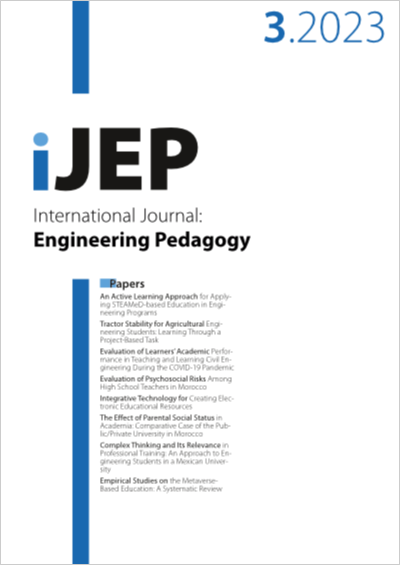An Active Learning Approach for Applying STEAMeD-based Education in Engineering Programs
DOI:
https://doi.org/10.3991/ijep.v13i3.34819Keywords:
STEM/STEAM/STEAMD/STEAMeD-based Education, Active Learning Approach, Engineering Education, ABET Accreditation, Liberal Arts in EngineeringAbstract
Applying STEM-based education in engineering programs using various active learning approaches has been shown to improve the quality of the learning process. This paper investigates further enhancements to the existing techniques via adding more emphasis on the learning components that are specific to Art, entrepreneurship, and Design. Different opportunities to apply the STEAMeD-based education in various engineering programs, which are delivered by liberal arts institutions, will be explored. The integration of the new emphases is demonstrated to resonate very well with satisfying the seven students’ outcomes that are dictated by ABET accreditation. The specific role of the augmented art component in promoting creativity, aesthetic appreciation, and better reasoning skills, is illustrated via different examples of simulation-based experiments and virtual modeling techniques. The entrepreneurship component of the engineering curricula is shown to better prepare the students for the challenging future via empowering them with better analytical skills, practical ingenuity, business-oriented communications, and adaptability to technological innovation, in an efficient way. It also overlaps with the requirements of the graduation design project that all students consider as the capstone of their engineering curricula. Adopting a project-based learning approach in many courses, at different levels in the curricula, proved to be very efficient, as verified by the many case studies illustrated in this paper. Tying the attributes of the STEAMeD-based education to the courses’ contents, with clear description of the learning outcomes, will be demonstrated. Also, addressing novel pedagogical approaches to better equip the students for their careers is considered. Finally, a comprehensive discussion and a conclusion is given to highlight possible extensions to the proposed techniques.
Downloads
Published
How to Cite
Issue
Section
License
Copyright (c) 2023 Ashraf A. Zaher

This work is licensed under a Creative Commons Attribution 4.0 International License.



